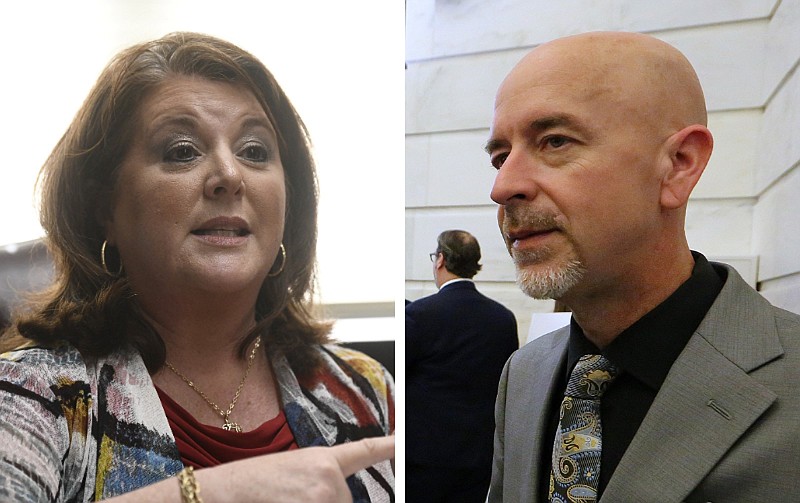The day after Arkansas Education Secretary Jacob Oliva fielded questions at a virtual “town hall” session about the state’s new omnibus education law, the president of the state’s largest teacher union said the answers were inadequate.
“Despite the event’s billing as an opportunity to answer questions about the state’s massive new voucher expansion, listeners walked away from the event with more questions than ever,” Arkansas Education Association President Carol B. Fleming said Thursday about The Reform Alliance online forum that featured Oliva.
At the same time, Fleming said it’s “no surprise that officials are scrambling and answers are in short supply.” “It’s only been just six weeks since the LEARNS Act was introduced by Governor [Sarah Huckabee] Sanders, rushed through the Legislature with minimal vetting, and signed into law,” she said.
The LEARNS Act is Sanders’ multi-pronged initiative to restructure kindergarten-12th grade education. LEARNS stands for literacy, empowerment, accountability, readiness, networking and safety.
The new law, Act 237, includes raising starting teacher salaries from $36,000 to $50,000 in 2023-2024; offering $2,000 raises plus incentive pay to teachers; eliminating the Teachers Fair Dismissal Act; expanding the availability of publicly funded tuition and supply vouchers for private and home school students; streamlining and expanding access to early childhood education; retaining some struggling readers in third grade; and creating a career education pathway to high school graduation.
Olivia said Wednesday night that the new law was the product of two years of Sanders meeting with a wide range of people as she considered and then committed to a run for the governor’s office.
The law’s publicly funded, private school tuition component — the Children’s Educational Freedom Account program — was the particular focus at the online forum.
The account program will be phased in over three years, starting this coming school year for kindergartners, special needs children, foster children, children of active military personnel and students assigned to F-graded public schools. By 2025-2026, all students can access the taxpayer-funded accounts for use in offsetting private school tuition, fees, uniforms and other education-related costs.
In response to questions posed by Emmy Henley, managing director of The Reform Alliance, Oliva said that specific and robust rules and regulations will be written to carry out the law and give parents flexibility in making school selections for their students.
More than 1,000 people from across the state have applied this month to serve on six work groups that will draft proposed rules that will eventually be acted on by the Arkansas Board of Education.
Work group members will be selected in the coming days, Oliva said and added that decisions on how families can apply for the educational freedom account will have to be made quickly to be useful to families who are now making decisions on school next August for their children.
“While we may not have all the answers for everybody today, we’ll get there,” Oliva said Wednesday night. “We’ll get these programs up and running. There may be some hiccoughs along the way, so I want to ask for people’s patience. At the end of the day it’s about students and not systems.” Fleming, the teacher association leader, on Thursday asked for more answers. “How does taking money away from public schools help improve student achievement?” she asked in a prepared statement.
“What is the mechanism to hold private and charter schools accountable for the use of public funds?” And “how will educators be engaged in creating these new rules, given that they have been shut out of discussions thus far?” she said. “How is this bill being paid for in the long run,” she also asked, “especially [with the governor’s proposed] tax cuts.” And, “While the pay for new educators will be raised, what will happen to the pay for experienced teachers?” Also, “will there be raises for school support staff who are also in short supply?” Fleming argued that the Arkansas LEARNS Act that eliminates the Teachers Fair Dismissal Act that provided job protection to teachers means Arkansas will lose teachers at a time of a national teacher shortage.
And while state leaders have said that the state will fund the $50,000 starting salary for teachers and $2,000 raises for veteran teachers, Fleming cited reports from school systems that the salary provisions in the new law threaten the financial stability of districts.
“[T]he chickens in this clucker of a bill are coming home to roost,” Fleming said.
The Educational Freedom Account program for Arkansas students will be phased in over three years, starting in the coming 2023-2024 school year for no more than 1.5% of the state’s public school enrollment of about 470,000.
Each student’s account would be equal to 90% of the state foundation aid provided for public school students in the prior school year. This year’s foundation aid is $7,413 per student.
The pool of eligible students for Educational Freedom Accounts would expand to include up to 3% of the public school enrollment in 2024-2025. Eligibility would be expanded to include students in both F-graded and D-graded schools as well as children of military veterans, law enforcement officers or first responders.
By 2025-2026, all students eligible to attend Arkansas public schools could access the taxpayer-funded accounts for use in offsetting private school tuition and other education-related costs.
Private schools that accept Educational Freedom Account students must be accredited by the state Board of Education or Arkansas Nonpublic School Accreditation Inc., or be an associate member and an applicant for accreditation by that organization.
The private school must employ teachers who hold at least a bachelor’s degree or have equivalent documented experience, and have gone through a background check.
Participating private schools must administer a state Board of Education-approved test to the Educational Freedom Account students. The aggregate results of the testing of private school students must be made public.
